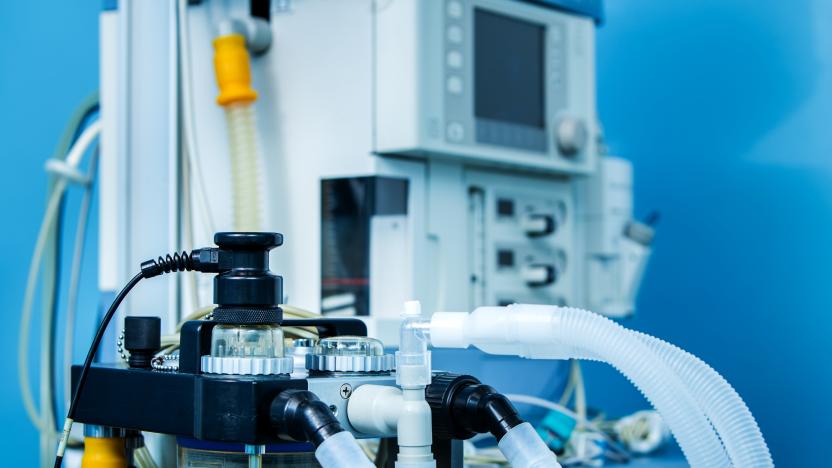Medtronic
Latest

NVIDIA and Medtronic are building an AI-enhanced endoscopy tool
NVIDIA and Medtronic are teaming up on an AI-powered endoscopy device that could help spot early signs of cancer.
Jon Fingas03.21.2023
Ventilator companies are opening up critical repair documents to the public
After being called out by the US Public Interest Research Group (PIRG), more ventilator manufacturers are sharing critical repair information.
Christine Fisher04.23.2020
Foxconn's contentious Wisconsin plant will be used to make ventilators
Foxconn’s dubious Wisconsin factory will be used to produce ventilators to aid in treatment for COVID-19 around the US
Rachel England04.08.2020
DHS issues warning about Medtronic implantable defibrillator flaws
The Department of Homeland Security and Medtronic are advising people with the latter's implantable defibrillators to keep their monitors and programmers updated and in sight. A warning issued by the department says over 20 Medtronic products are afflicted with vulnerabilities that could be exploited by attackers nearby. Sixteen of the products are implantable defibrillators -- some still sold around the world today -- while the others are the defibrillators' bedside monitors and programmers. According to the Star Tribune, as many as 750,000 devices for the heart come with the flaws.
Mariella Moon03.22.2019
FDA approves first automated insulin system for type 1 diabetes
For diabetes patients, managing blood sugar levels through insulin pens, needles or pumps is a necessary hassle -- but it might be far easier to handle going forward. The US Food and Drug Administration has approved the first automated insulated delivery device for type 1 diabetes, Medtronic's MiniMed 670G. The gadget uses a sensor to detect glucose levels under your skin every 5 minutes, and supplies just enough insulin to keep your blood sugar stable. While you do have to trigger a manual insulin dose after meals, you generally won't have to be as involved in the process as before.
Jon Fingas09.28.2016
FDA approves 'world's smallest' pacemaker for heart patients
As consumer technology has trended smaller and thinner, medical devices have done the same. And now, the first transcatheter pacemaker has been approved for use with heart patients in the US. Medtronic gained FDA approval for its Micra TPS pacemaker, the first device to employ the miniaturized pacing tech to be approved by the US government. The company is calling the device the "world's smallest pacemaker," measuring just a tenth of the size of traditional technology. It's about the size of large vitamin.
Billy Steele04.07.2016
IBM's cognitive computer will help solve your health problems
Just because you can collect a lot of information about your health doesn't mean that you can easily make sense of it. How do you connect the dots between, say, your smartwatch and your medical records? IBM thinks it has the answer: it's launching Watson Health Cloud, a platform that uses the company's cognitive computer system to help companies and doctors make decisions based on data that might otherwise prove daunting. They could recommend a change in your prescription, for example, or outline your surgery recovery plans.
Jon Fingas04.13.2015
Medtronic debuts tiny lead-less pacemaker at TEDMED 2010
There are two pacemakers in the picture above. There's the typical clunky, stone shaped device with wires on the right -- and on the left, a device dwarfed even by a one-cent coin. This is the Medtronic wireless pacemaker, just revealed at TEDMED 2010, which can be implanted directly into your heart via catheter and permanently latch itself into flesh with tiny claws. Then, doctors can wirelessly monitor and even control the device from a nearby smartphone. Medtronic's working to make it even smaller still, and we're hoping to get more information soon. Welcome to the future, folks. %Gallery-106218%
Sean Hollister10.28.2010
Medtronic's LIFEPAK 15 defibrillator for extreme conditions, or extremely clumsy paramedics
Sure, everybody loves a tough notebook -- but there are all sorts of gadgets that can benefit from the tough treatment. Adding to the list of electronics suitable for dropping, kicking, and spraying with water, Medtronic's LIFEPAK 15 -- which just received FDA approval, by the by -- is a portable heart monitor / defibrillator equipped with all sorts of fun features, including an audible CPR Metronome, a dual-mode color LCD with a high-contrast mode for use in bright sunlight, up to six hours of operating time, and energy dosing for difficult-to-defibrillate patients. Just make sure it's nice and dry before you plug the paddles in. For reals. Video after the break.[Via Medgadget]
Joseph L. Flatley03.31.2009
Medtronic's implantable OCD treatment okayed by FDA
Looks like those brain pacemaker researchers are a bit late on this one, as folks at Medtronic are apt to get the jump on advanced OCD treatment given a recent FDA approval of their device. Hailed as the first implantable device "designed to deliver electrical therapy to the brain to suppress symptoms associated with severe obsessive-compulsive disorder," the Reclaim DBS (deep brain stimulation) Therapy was said to be able to treat OCD patients in cases where drugs and psychotherapy failed. Understandably, Medtronic is doing everything it can to get the product out by the middle of this year, and following up on its good fortune, it also proclaimed that it had started up a randomized clinical trial of DBS for treatment-resistant depression. There's no mention of an expected price, but apparently only 4,000 or so will be needed each year.[Via Vos Iz Neias, thanks yossi]
Darren Murph02.24.2009
Medtronic Diabetes concept car monitors glucose levels in-dash
Operating a vehicle during a diabetic blood sugar crash can be a dangerous proposition for both driver and others on the road. That's why Medtronic Diabetes developed the M-POWERED concept car that allows a person to constantly monitor glucose levels via both audio and visual cues. The Lincoln sedan was unveiled at this year's American Diabetes Association annual meeting in San Francisco. No word on what happens during a glucose drop, but we imagine some sort of alarm and then, perhaps, shutdown occurs.
Joshua Fruhlinger06.12.2008